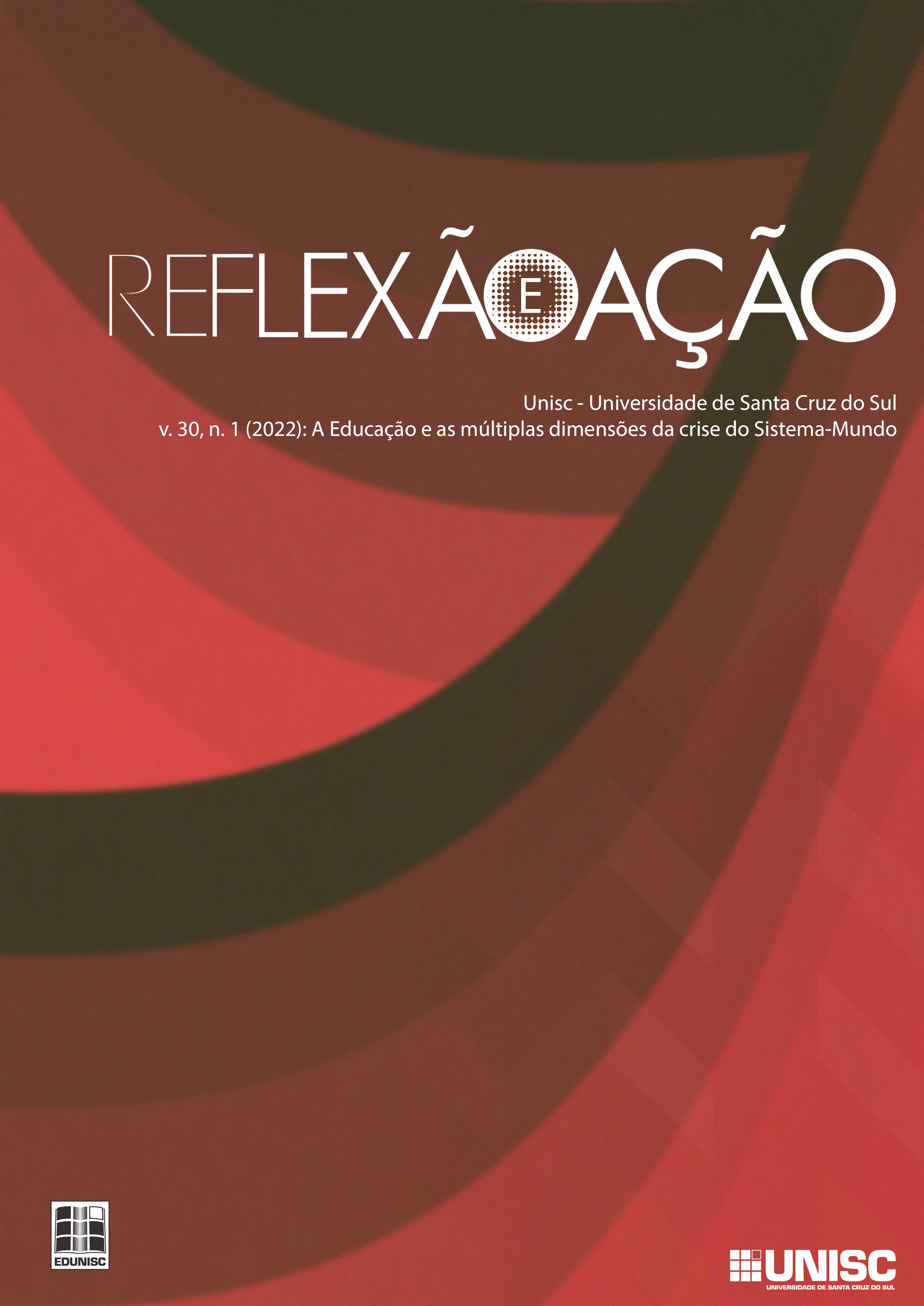Evaluation of Learning: the question of future teachers as protagonists of the process
DOI:
https://doi.org/10.17058/rea.v30i1.15131Keywords:
evaluation, teachers, learningAbstract
The material and research reported here was gathered during the course of a module entitled, Didactics, delivered to the future teachers of different fields of knowledge, in a private University, located in the South of Brazil. It is a compulsory unit in the curriculum, and it has been constructed using three elements of pedagogy; learning, teaching, and evaluation. The study focuses on the dimension of evaluation of learning. It starts from the undergraduate students' own anxieties concerning evaluation, which in turn are used as a means of progressing to the study of the theory of evaluation. The students were asked to formulate questions about evaluation, expressing their doubts, the aspects that concern them in relation to the subject, and those they consider essential to learn for the ability to form good evaluation. The analysis carried out resulted in three final categories: Principles and conceptions of evaluation; Management of the evaluation process; Evaluation in specific groups. Discursive Textual Analysis is an appropriate method of analysis for use in research in the field of teacher education.
References
BERNARDO, G. Educação pelo argumento. Rio de Janeiro: Rocco, 2007.
CAMARGO, J.; PORTO, J. S. O efeito tamanho da turma sobre o desempenho escolar: uma avaliação do impacto da “enturmação” no ensino fundamental do Rio Grande do Sul. Porto Alegre: UFRGS, 2014.
DENZIN, N. K.; LINCOLN, Y. O planejamento da pesquisa qualitativa. Teorias e abordagens. Porto Alegre: Artmed, 2006.
FLICK, U. An introduction to qualitative research. 5. ed. Thousand Oaks: Sage publications, 2014.
FINKEL, D.L. Teaching with your mouth shut. Portsmouth, N.H. Boynton/Cook, 2000.
GRILLO, M.; FREITAS, A. L. S. Autoavaliação: por que e como realizá-la? In: GRILLO, M.; GESSINGER, R. M. (Orgs.). Por que falar ainda em avaliação? Porto Alegre: Edipucrs, 2010.
GADAMER, H. G. Verdad y método: fundamentos de una hermenéutica filosófica. Salamanca: Sígueme, 1984.
HADJI, C. Ajudar os alunos a fazer a autoregulação da sua aprendizagem: Porque? Como? Pinhais: Melo, 2016.
HADJI, C. Avaliação desmistificada. Porto Alegre: Artmed, 2005.
HANUSHEK, E. A. Publicly provided education. In: AUERBACH, A. J.; FELDSTEIN, M. (Ed.). Handbook of public economics. Amsterdam: North-Holland, 2002.
JOHNSON D. W. AND JOHNSON R. T., , Learning together and alone: Cooperative, competitive, and individualistic learning. Boston, MA: Allyn and Bacon, 1999.
LIMA, V.M.R. Universalidades e singularidades presentes no método de Análise Textual Discursiva. In: LIMA, V.M.R.; RAMOS, M. ; PAULA, M.C. Métodos de análise em pesquisa qualitativa: releituras atuais. Porto Alegre: EDIPUCRS, 2019.
LUCKESI, C. C. Avaliação da aprendizagem escolar: estudos e proposições. 22. ed. São Paulo: Cortez, 2011.
MITTLER, P. Working towards inclusive education: social contexts. New York: David Fulton, 2012.
MORAES, R.; GALIAZZI, M.C. Análise Textual Discursiva. Ijuí: Unijuí, 2007.
PÉREZ GÓMEZ, A. I. Educação na era digital: a escola educativa. Porto Alegre: Penso, 2015.
SILVA, T. T. A produção social da identidade e da diferença. In: SILVA, T. T. (Org.). Identidade e diferença: a perspectiva dos estudos culturais. 11. ed. Petrópolis: Vozes, 2009.
STAKE, R. E. Qualitative Research: studying how things work. New York: Guilford, 2010.
TARDIF, J. L’évaluation des compétences: documenter le parcours de développement. Montréal: Chenelière Éducation, 2006.
TRIVIÑOS, A. N. S. Introdução à pesquisa em ciências sociais. São Paulo: Atlas, 1987
YIN, R.K. Case study research: design and methods. 5. ed. Thousand Oaks: Sage publications, 2013.
OLABUENAGA, J. I. R. Metodologia de investigación cualitativa. Bilbao:Universidad de Deusto, 2007.
SOUZA, R S ; GALIAZZI, M. C. Compreensões acerca da hermenêutica na Análise Textual Discursiva. Editora.Ijuí: Unijuí Ano 31 nº 100 Set./Dez. 2016
Ens, R. T., Ribas, M. S., & de Amorim Favoreto, E. D. Discursive Textual Analysis of Brazil’s National Curricular Guidelines for Youth and Adult Education: Meanings and Senses. Creative Education, 7, 1759-1764, 2016. http://dx.doi.org/10.4236/ce.2016.712179.
Downloads
Downloads
Published
How to Cite
Issue
Section
License
The submission of originals to this journal implies on the transference, by the author(s), of the printed and digital publishing rights. The author´s rights to the published articles are the author´s, the journal has the rights over the first publication. The author(s) can only use the same results in other publications, indicating clearly that this journal was the original publisher. Since we are an open access journal, the free use of articles is permitted for educational and scientific applications, as long as they inform the source according with the CC-BY license from Creative Commons.


